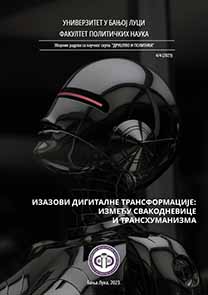Odnos fiktivnog i realnog u Hanekeovom filmu "Smiješne igre": "Četvrti zid" kao parabola o prisustvu
Relationship between the fictional and the real in Haneke’s film “Funny Games”: “Fourth wall” as a parable of presence
Author(s): Stefan ElezovićSubject(s): Social Sciences, Media studies, Sociology, Theory of Communication, Studies in violence and power, Film / Cinema / Cinematography
Published by: Fakultet političkih nauka Univerziteta u Banjoj Luci
Keywords: violence; post-reality; responsibility; media; technology;
Summary/Abstract: The subject of this paper is a reflection on Haneke’s film “Funny Games” from 1997. The thematic focus is related to a sociological analysis of the content of the mentioned film and the correlation of this content with Heidegger’s conception of technology, Adorno’s and Horkheimer’s critique of mass culture, Jonas’s ethics of responsibility, and Baudrillard’s concept of simulation. The film in question highlights the issue of media representation of violence in the context of post-reality. Violence is presented as a form of entertainment, and the act of torture itself is depicted as a performance. The wall between the audience and the actors in the film is broken down, and the role of the film viewer is hypostasized as that of an actor. The basic assumption of this paper is based on the idea that action on a micro level forms a macro effect that leads to the establishment of a new reality. Haneke’s film “Funny Games” affirmatively responds to the aforementioned assumption. Exposure to the influence of the virtual space through actions on subjects has consequences on reality. Through the breaking of the “fourth wall,” the film “Funny Games” problematizes the relationship between the audience and the media, i.e., the relation between the fictional and the real. By focusing on the content of the film and the methods of analysis, synthesis, deduction, and induction, we come to the conclusion that the film “Funny Games” is a metaphor for the image of the contemporary era. Visual representation influences the objectification of the virtual world, so the analysis of the content of visual media opens up as one of the most pregnant perspectives for insight into the nature of objectivity in the contemporary context.
Journal: Društvo i politika
- Issue Year: 4/2023
- Issue No: 4
- Page Range: 197-211
- Page Count: 15
- Language: Serbian

